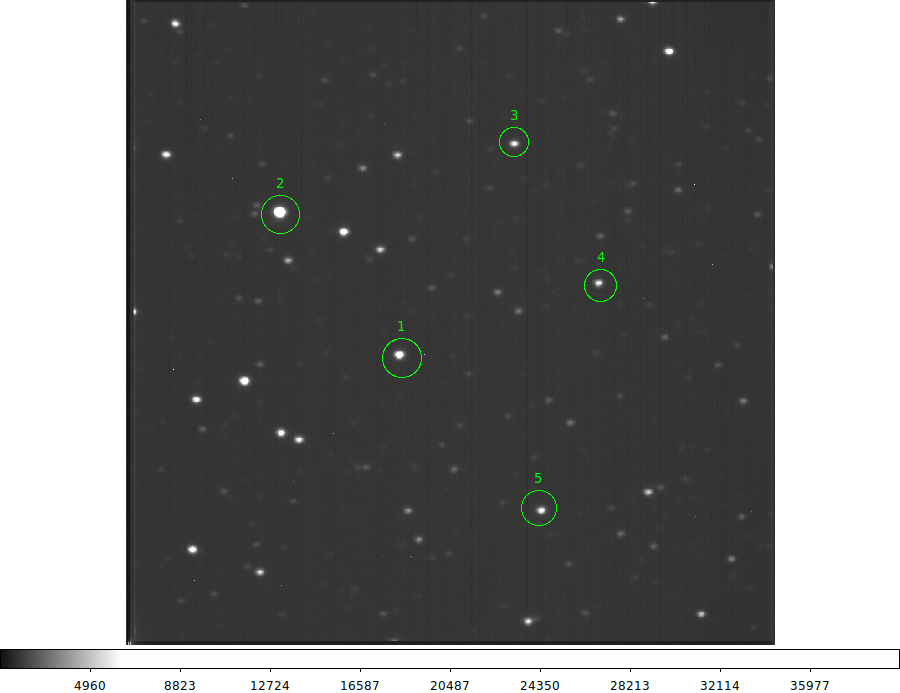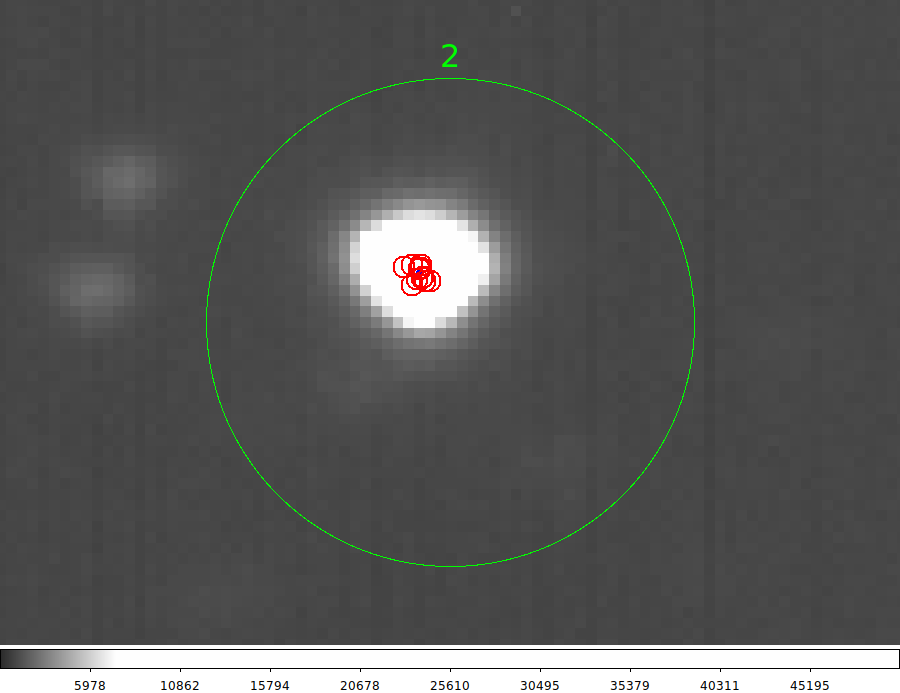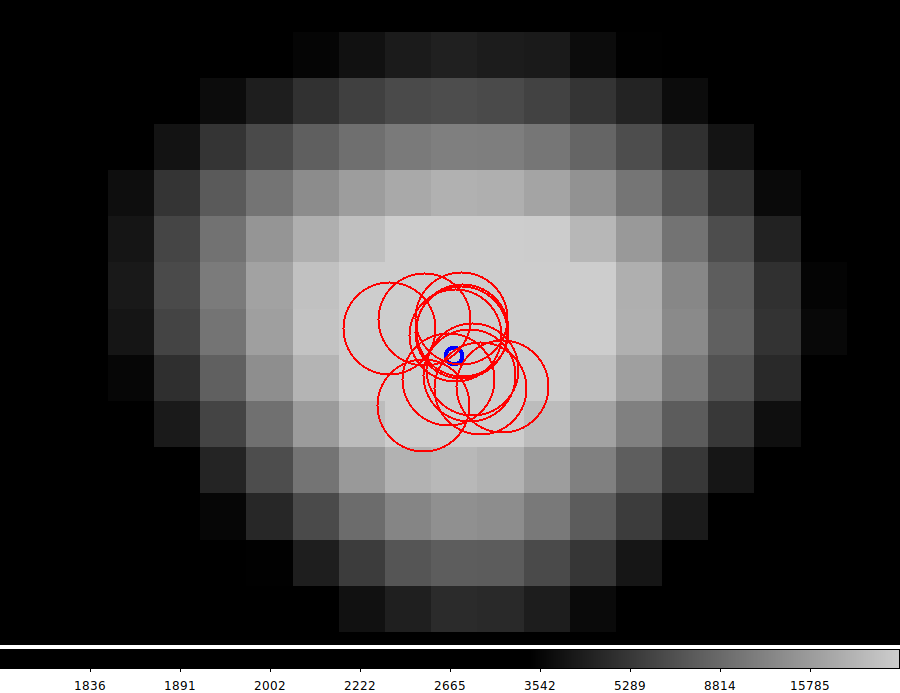Telescope Offsets
Last Updated: Nov21,2019
Measuring telescope offsets on the sky can be used for a variety of problems. The basic tools
behind how we measure the gc plate scales using offsets are shown below. Later I used some of
these same tools to measure the offsets observed in dithered VIRUS observations. As I reduced
more nights and tackled different problems, I began to compress and clarify the documentation.
The basic results, ordered roughly by generality and clarity, are given below.
- Measuring VIRUS fither offsets (Nov 2019)
- Final report on gc plate scale measurements using offsets. (Oct 2019)
- Early gc1,gc2 plate scale derivation studies. (Summer 2019) .
 |
|
This is the last of a set of 12 acm images taken at one point on
the sky, refereed to as PointA in this example. These images were
collected during HET commissioning work after an FPA takedown on
20190711 (UT). I have marked 5, bright and fairly isolated stars.
The stars are labeled so that we can measure the same set of stars
(in the same order) at another sky position (PointB). The green circles
represent the initial measurement apertures that will be used to
derive an intensity-weighted centroid position for each star.
|
 |
This is a zoomed-in view of star 2 in the previous figure after the
run of the measurement code (ds9_imstats_fitslist) has been run:
% ds9_imstats_fitslist ./S/list.acm_A FixedRegions N
The red circles represent the intensity-weighted centroid positions derived
on each of the 12 images in the PointA set. Notice that the star image is
slightly displaced from the center of the green "measuring aperture".
This is becasue the green circle was set only approximately with a manually
placed ds9 region (using the code ds9_imstats_markerII). The red circles do locate
the star position on their respective images as they are derived from intensity-weight
image centroids (i.e. first moments). The image displayed here is the last image in
the set of set of 12 images made at PointA. The blue point is the mean position of
the twleve centroids.
|
 |
|
This is a "more zoomed-in" verison of the previous figure for star 2.
Here we see he scatter of the image positions measured on each
of the twelve PointA images (the red circles). Each red circle has
a radius of 1 pixel. The thicker blue circle represents the mean position
of these 12 centroids. The (blue) circle has a radius that is equal to
the mean error of the mean X centroid posution (in pixel units).
|
The basic results from the two pointings (A and B) are tables of mean centroids for
each of the 5 stars. Each table of mean value is named "XYmean", but they are written
to different subdirectories and, hence, not overwritten. Note that for pointA we had
12 acm images, and for pointB we had 11 acm images.
What is each column of the table?
% cat XYmean.parlab
xmean Mean X centroid (pixels)
xmedian Median X centroid (pixels)
xme mean error of X centroid (pixels)
nx number of X positions
ymean Mean Y centroid (pixels)
ymedian Median Y centroid (pixels)
yme mean error of Y centroid (pixels)
ny number of Y positions
For PointA:
% pwd
/home/sco/GC_Plate_Scales/acm_A
% cat XYmean.table
# data
326.21753 326.34000 0.17486 12 347.81418 347.91998 0.18122 12
183.01666 183.17499 0.18734 12 518.46503 518.53497 0.19544 12
463.34250 463.48001 0.17218 12 600.42255 600.47998 0.18185 12
564.21088 564.35498 0.17253 12 433.29745 433.37500 0.17868 12
495.47672 495.57501 0.17933 12 161.39168 161.41501 0.16231 12
For PointB:
% pwd
/home/sco/GC_Plate_Scales/acm_B
% cat XYmean.table
# data
326.88727 326.92999 0.15816 11 392.62180 392.76001 0.23252 11
183.74182 183.66000 0.16528 11 563.15729 563.31000 0.24223 11
463.95450 463.94000 0.15841 11 645.00092 645.15002 0.22412 11
564.76733 564.79999 0.15992 11 478.08545 478.17001 0.22294 11
496.30820 496.34000 0.15377 11 206.01181 206.00999 0.22103 11
The software used.
The software used to perform the steps describe above are listed below:
ds9_imstats_fitslist == perform photometry on sets of images to derive tables files
that contain XY centroids.
Usage: ds9_imstats_fitslist list.in FixedRegions N
arg1 - list of input images
arg2 - case (none, FixedRegions)
arg3 - run in debug/verbose mode
table_XY_offsets.sh == compile tables of mean offsets based on the table file from
runs of ds9_imstats_fitslist.
Usage: table_XY_offsets.sh tabA tabB XYmean xmean ymean xme yme N
arg1 - basename of table 1 (A for A.table)
arg2 - basename of table 2 (A for A.table)
arg3 - param name for X position
arg4 - param name for Y position
arg5 - param name for error in X position
arg6 - param name for error in Y position
arg7 - run in verbose/debug mode (Y/N)
pas_XY_offsets.sh == determine image offsets PAS X,Y centroids
Usage: pas_XY_offsets.sh list.1 list.2 N
arg1 - list of set1 PAS images
arg2 - list of set2 PAS images
arg3 - radius in pixels for the xy1,2.reg files
arg4 - run in verbose/debug mode (Y/N)
acm_offset == Given the acm offset (and error) in pixels compute the offset and
error in arcseconds (for feeding to gcps.sh).
Usage: acm_offset 40.9708 2.1634
arg1 - offset in pixels
arg2 - mean error in pixels
arg3 - run in debug (Y/N)
gcps.sh == compute gc plate scale when you know the acm offset and error in arcseconds
and the gc offset in pixels
Usage: gcps Y
arg1 - run in debug mode
Back to calling page


